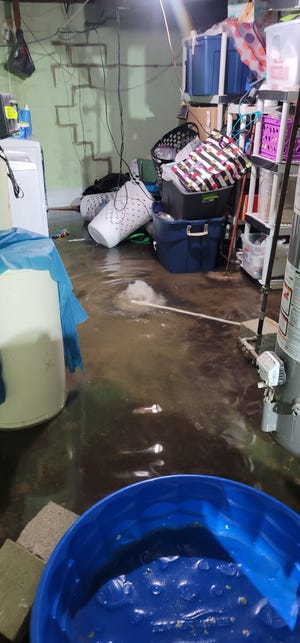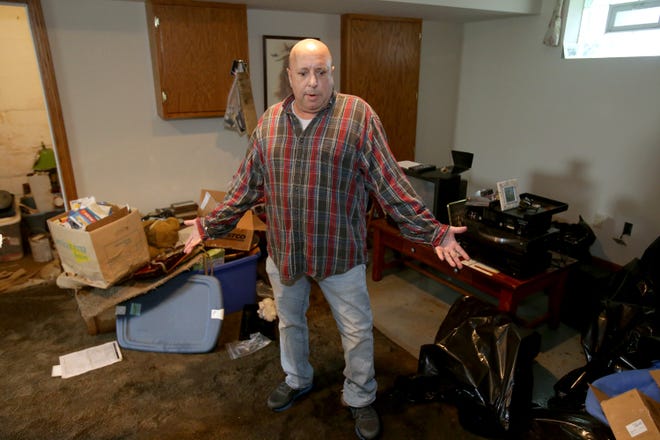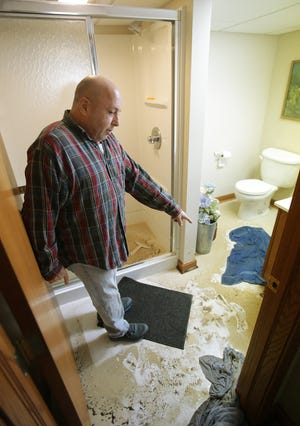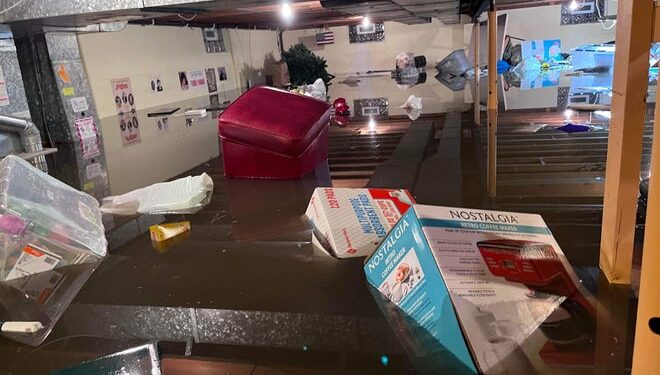[ad_1]
NORTH CANTON – Judy Meade was in Zanesville Saturday evening when her husband, Randy Grishaber, called, telling her she needed to hurry back home — the basement was rapidly filling with water.
“[He] said, ‘Judy, it’s coming up like a geyser.’ He said you’ve got to come home,” the 63-year-old Meade said. “So I called his son, he got over there, and everything’s just floating in the basement. My husband said it was like the Titanic.”
Saturday night flooding:North Canton area recovering after intense rain, hail storm
Several areas in North Canton saw flash flooding Saturday as heavy rainfall and hail overwhelmed the city’s stormwater system. The National Weather Service said between two and four inches of rain fell in a short period of time in some parts of the city. North Canton Director of Administration Patrick DeOrio said the number of homes and businesses impacted by the flooding is “in the hundreds.”
By the time the rain stopped, the water in the Meades’ basement had risen to four feet high. Their belongings — including a brand new washer, two dryers, hot water tank, furnace, deep freezer full of $400 in groceries and countless personal and sentimental items — were all submerged in brackish water that Meade says was full of sewage.
“I have to pay for a new furnace, a new hot water tank,” she said. “We’re seniors, we’re living on a budget; where do we get the money?”

Flooding a persistent problem for some North Canton residents
While this most recent flood was certainly the worst, Meade said she’s seen her basement flood at least six times in the eight years she’s lived at her home just off North Main Street.
In at least two of the previous times, she said, the city paid for plumbers to come and address the issue of sewage flowing into her home. Unfortunately, the fixes they made didn’t hold up against Saturday night’s flooding.
Meade said her insurance will cover only up to $5,000 in damage, and she’s still in the process of calculating just how much was lost. With her hot water out and the smell of sewage still strong in the house, she said she’s headed to a hotel while cleanup takes place. She’s concerned about paying for it.
She’s hoping the city will look into issues with the sewer lines or find some way to prevent this.
“This flood might’ve took my things, memories and stuff that me and him did, but it won’t take it out of my heart,” Meade said. “We just have to buy new and start over. Seventy and 63 years old. He even told me he’d rather be dead. We don’t want to go through this no more.”

‘Our street storm sewers can only handle so much volume.’
Current plumbing standards require sanitary sewage lines to be separate from storm sewers, meaning in a storm event like Saturday’s flood, sewage shouldn’t be able to get caught up in the rain water. Historically, that wasn’t the case, and in many homes, the sanitary drainage connected to the same lines as the storm water systems.
DeOrio said he could not say what happened at any particular home in the city, but that through the city’s history of annexing neighborhoods that may have had different plumbing standards, there’s a chance there are still areas with these combined sewers.
“Over the decades since that, the sanitary sewer treatment plants are saying, ‘Listen, hey, way too much stuff coming down here in this water and it’s costing us a fortune to treat it when we don’t need to treat it, it’s good old fashioned rainwater,'” DeOrio said. “So we try to keep that out of the system. So over the years, we have been replacing those lines where they were combined, but there are still some out there.”
Looking ahead, North Canton Mayor Stephan Wilder said that with all the debris that the flood likely washed into sewers, the city may need to send crews out with cameras to check the storm lines for blockages.
“I know we continue to make improvements on our storm sewers, but in that kind of velocity of water coming down our streets, our street storm sewers can only handle so much volume, and I saw areas in the city that had never in my 40-year career here, that had never flooded,” Wilder said.
Wilder said he reached out to the Federal Emergency Management Agency and Stark County Emergency Management Agency to see what, if any, financial assistance might be available for impacted residents, but came up empty. Disaster assistance requires a disaster declaration, a decision made at the state and federal level when a natural disaster is large enough.
“We’re at the mercy of Mother Nature. I mean, how do you prevent high winds? How do you prevent the hail from coming down?” Wilder said. “And I think people just need to be cognizant as to where they buy and where they live. I don’t mean to be that cruel in saying that.”

‘This is because of the city sewers.’
The extent of the damage that the flooding caused to individuals remains to be calculated. In the days after the flood, residents were busy calling repair and plumbing companies to pump water out of their basements and beginning the process of cataloguing their belongings to get as much covered by insurance as they can.
Just up the street from Meade, neighbors Candice Cavender and Dan Schoenberg were also among those impacted by the flood.
Cavender is a teacher currently taking time off to parent. She was out of the house Saturday night when the flooding started. Her teenagers were playing video games with friends when the water started bubbling up through the family’s recently renovated basement. But with their headphones on, they didn’t hear the alarm warning them.
“It didn’t stop until midnight and it took until 2 a.m. to go down,” Cavender said. “And then all of this black dark stuff is human feces and whatever else was in our sewer systems.”

Due to the basement renovation, much of the family’s belongings were already out of the flood zone ahead of time, but they still lost hundreds of dollars of food in the deep freezer and baskets of laundry. She said the kids don’t know yet, but the family isn’t able to afford any sort of summer trip anymore.
“I don’t know if any of my baby stuff was in there, like baby books and stuff like that,” Cavender said. “They want me to go down before they come back tomorrow to finish up and I don’t know if I have the heart to go down and look at the stuff and go, ‘Oh my God, look what happened.'”
She said she called the city and left a message when there was no answer. City officials say they’ve been working through hundreds of calls in the last several days.
Cavender said her family has sunk a lot of money into their home — from the basement renovation to repairing the roof to recovering from an electrical fire to replacing the plumbing. Even if they could sell the house, which Cavender said would never make them back the money they’ve put in, they love North Canton. They just don’t want to deal with flooding anymore.
“This isn’t because of my basement,” she said. “This is because of the city sewers, their system.”

At Schoenberg’s house next door, the story is similar. He’s in his 60s, and lives on disability assistance due to a series of injuries. When the flooding started, he rushed to his basement to carry out what he could — paintings that belonged to his father, photos, electronics, wood furniture that would be destroyed by water — but with his injuries he struggled to save much of his stuff.
He’s also seen flooding in his basement twice before, but thought he had mitigated the issue with some recent sealing work.
“This one was a lot worse because it was pure brown poop sewage water,” Schoenberg said. “You can smell it. I can’t even eat upstairs. The kitchen is right there. I can’t cook in that stuff.”

He, like other residents, is hoping the city will look into the sewer system. The water that poured out of his basement shower and soaked through his carpeting was brown, and smelled like sewage, and many of his belongings he’s simply throwing away because of the damage.
“I don’t know where I’m gonna get the money,” Schoenberg said. “I’m gonna have to put all my credit cards on.”
If you are a North Canton resident dealing with the aftermath of the flood, please reach out to Sam Zern at szern@cantonrep.com.
What to do when your house floods
Understanding your risk is an important part of flood mitigation: use FloodSmart.gov to assess your home’s risk for flooding and your potential needs. You may consider purchasing flood insurance or adding an endorsement for water backup to your homeowners insurance, depending on the type of water damage you may be at risk for.
When a flood occurs
- Never wade through flood water. It can contain hazardous materials or may even be energized due to interaction with an electrical system.
- Shut off your gas and electricity before beginning water abatement.
- Remove as much water as you can, whether through a wet vacuum or with the help of a plumber or water mitigation team.
- Dry out the area to prevent mold growth using fans and dehumidifiers
- Assess the damage to belongings and contact your insurance company for guidance on your policy
[ad_2]
Source link






